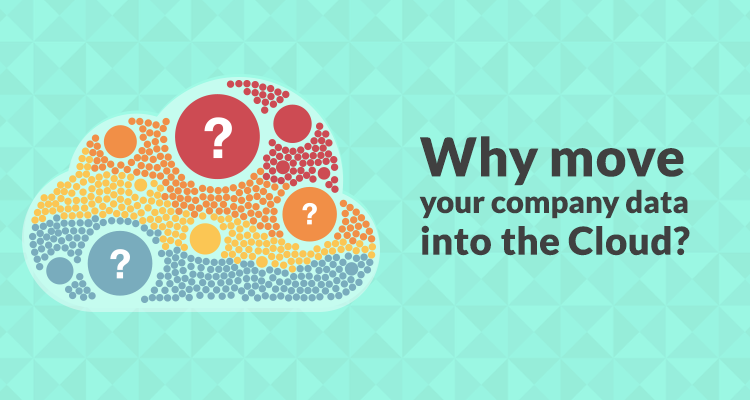Some companies are still owning and managing their own hardware servers. It may seem to make sense to want to control your own machines and try to keep them secure yourself. But what if you didn’t have to? What if you didn’t have to buy the machines, house them, repair them, keep them secure and all of that? What if you could have secure access to your company data? And scale your server space up and down to meet your need at a moment’s notice? You can put your energy into other things than managing hardware.
A lot of companies built their infrastructure from the ground up, with their own hardware servers, sometimes even their own data center. This made sense, as the data hosting alternatives out there were not mature enough. That argument no longer holds up.
“The cloud” is not a new and underdeveloped concept anymore. It has become a secure and practical, as well as financially sound, way to house your data. The cloud is now fit for use by all, from the smallest entrepreneur to the largest corporation. This article is mainly about the benefits for you, the latter. Allowing your company to focus on its core business, and hiring a professional provider for your data storage needs is rapidly becoming the norm and this is why.

Keeping up with the times
Computers and online tech are developing at a very rapid rate. It’s hard to keep up with the news in the area if you want to take care of everything yourself. According to Moore’s law, computational power doubles every two years. Even, if Moore’s law is now slowing down due to density and other physics factors, this means it will always be an effort to keep up.
Simply put, cloud computing is computing based on the internet. Where we formerly used applications and programs from software located on our own computers or servers, we can now access the same functionality and more from the cloud. It’s a whole lot easier to update one cloud instance than tens or maybe even hundreds of individual computers. Take a snapshot of your cloud instance, make a backup as well and then update. If anything goes wrong, you can do a rollback. In the old days, we had to patch many, many machines. Keeping all applications updated was tiresome work. That is no longer the case. Mature cloud users go even a step further, never updating their instances but rather deploying fresh new ones as needed and switching the application over thanks to automation and configuration managements tools.
It’s easier for a specialized player like a cloud provider to take care of a cloud infrastructure, with more people working with the servers, specialization on different areas becomes possible. This enables staying at the cutting edge of technology. If you want to take care of everything yourself, on the other hand, you will need a whole team of experts in different fields.
Servers grow old, some do so very fast. It can rapidly become a complicated practical affair to make sure you always have state of the art equipment.
Scalability is necessary
When you host your data yourself, scalability becomes a logistical nightmare. As your business expands, or your needs in different areas fluctuate, you’ll need more space and computing power. If you take care of the hardware yourself, you first have to order it and then install it. In a lot of cases this takes more time than you’d like. And should your needs go down, for instance at the end of a particularly large project, the scaling down is virtually impossible.
When you use a good cloud provider, you can scale up or down at a moment’s notice and only pay for what you use.
Handling security is easier
When you’re owning your own servers, you need complimentary appliances. Most often you need to use a firewall that requires specific skills to maintain. With a serious cloud provider, you’ll get an integrated security solution. Some of the security will still be up to you, but it’s easy to get started and handle your own security routine. Much easier, in fact, than if you’d do all your own hosting.
More often than not, when migrating production workloads from an on-premises infrastructure to a cloud reveals how much gains in security the cloud offers. Typical on-premises setup uses a standard DMZ setup with firewall appliances and those frequently contain ghost access rules which have not been cleaned up when a specific application or server was decommissioned. Security groups in cloud automatically cleans after itself, thereby enforcing security without any manual tasks.
A different but related issue is data privacy. In many countries the government still retains the right to access company data without prior consent. This could be a problem if you maintain your own servers but use an external data center. A few countries have realized the need for integrity and have instituted strict data privacy laws. The Swiss law on data privacy is very strong, for instance.
Cost efficiency
Handling your own hardware means you have to have an overcapacity of servers, spare parts, server racks and also some staff would be tied up with handling the tasks connected to the hardware (regularly testing the hardware, replacing faulty parts and so on).
Using a public cloud provider has many advantages. Pay for what you use, you don’t have to plan in detail what capacity you’ll need, because you can scale up and down almost instantly. Updated hardware without having to order and maintain it makes for cost efficient data storage solutions. A cloud provider is specialized and takes care of the cloud, so you can focus on your core business. You will end up saving money.
Summing up
By doing less work, you can spend less, be more flexible and get your data storage secure. The hardware beneath your cloud storage will be maintained and developed by experienced experts whose sole objective is to maintain a high SLA.
Staying updated will no longer be an effort, security handling will be simplified. Scalability is a given. It can all be achieved with a serious cloud provider, at significantly reduced cost compared to owning and operating the hardware yourself.
Moving into the cloud, using a reliable cloud provider for your data storage needs is the way to go. It’s a win on all fronts.
